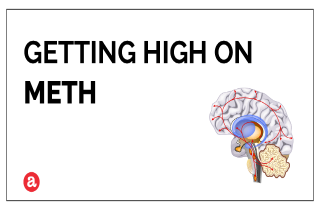The downward spiral
Yes.
The main reason people meth is to get high. But, getting high on meth can come at a cost. Methamphetamine (N,α-dimethylbenzeneethanamine) or meth, is a powerful long-acting stimulant drug that is highly addictive. Many use the drug because it’s fun and makes them feel good, but what they may not be aware of is that they are already on a downward spiral.
How does meth work in the brain to produce its euphoric effects? Are you playing with fire or already addicted to meth? We dig into meth’s brain and body effects here. Plus, we cover the signs and symptoms of meth addiction in the text below. Then, we welcome your remaining questions via the comments section at the end of the page. In fact, we try to answer all real-life questions personally.
Meth chemistry and use
Meth usually appears as a powdery substance in a variety of colors. It has a bitter taste and no odor. It is usually sold in pill form, as capsules, powder, or crystals known as “ice”. Tablets containing methamphetamine may carry logos similar to those seen on ecstasy (MDMA) tablets.
How is meth abused? It can be swallowed, smoked, snorted and injected. In its crystal form (ice), methamphetamine hydrochloride evaporates when heated and can be inhaled by smoking.
Meth and euphoria
The effect that users seek from meth is an intense pleasure called euphoria. Following oral use, meth effects kick in with an initial rush that can last for 30 minutes. Then, the euphoria (meth high) sets in. Euphoric feelings from meth can last for many hours and make users become more confident, sociable and energetic.
Meth and central nervous system effects
As a central nervous system (CNS) stimulant, methamphetamine directly affects the brain and the spinal cord by interfering with the normal release and uptake of neurotransmitters (chemicals that nerve and brain cells produce to communicate with each other). Dopamine is the primary neurotransmitter affected by methamphetamine, but norepinephrine and epinephrine are also affected.
The use of methamphetamine causes the release of large quantities of these neurotransmitters. Effects that occur as a result of this over-stimulation, include:
- a boost of energy
- alertness
- elevated blood pressure
- enhanced sexual arousal
- increased self-confidence
- rapid heart rate
- sensations of pleasure
- suppressed appetite
Users may also display sleeplessness, talkativeness, teeth grinding, increased body temperature, and compulsive behavior, such as skin picking.
Getting high on meth
People get high on meth by snorting it, mixing the drug into a solution and injecting, or in its rock form by heating it into a gas and then smoking. The consumption results in a temporary sense of exhilaration and hyperactivity known as a “high”, which can last for four (4) to sixteen (16) hours. During the peak of effects, users usually feel more smarter, aggressive, and argumentative.
But, the pleasurable effects of meth will wear off soon; then, the “crash” sets in. After a methamphetamine high, users can go into a deep sleep that can last for up to three consecutive days. Other effects felt during a meth crash include:
- anxiousness
- dehydration
- depression
- hunger
- irritability
- lethargy
- physical exhaustion
- restlessness
- sleepiness
Extreme cases may lead to suicidal tendencies and violency-prone behavior.
When do people get addicted to meth?
People get addicted to meth after a few uses, or after a regular, daily use of meth for a few weeks.
Meth use can quickly lead to addiction. In fact, meth stimulates the brain in the same way that eating, drinking water, having sex (reproduction), and other activities that are good for your survival do. By creating this rewarding feelings, meth motivates people to use it again and again.
Some users report feeling “hooked” on meth even after a few uses. The risk of developing addiction more quickly is greater in individuals who have a previous history of substance use disorders. Those who seek the drug to stay energized and awake, and those who use it for weight loss also have higher rates of addiction to meth.
Addicted to meth?
People who become addicted to meth tend to have more energy in the beginning. Addiction would be easy to miss if the person is already very energetic. If you are suspecting that someone might be addicted to meth, then look for sudden and drastic changes in sleeping habits (s/he is not sleeping well; sometimes only a couple of hours a night, or sleeping for a few days in a row). Other signs and symptoms of meth addiction that can signal you when something is wrong, are:
- A failure to fulfil major role obligations at work, school, or home.
- Change in personal grooming habits.
- Deteriorated physical appearance.
- Lack of interest in important social, occupational, or recreational activities.
- Looking exhausted and fatigued.
- Mood shifts from one extreme to another.
- Secretive or suspicious behavior.
- Sudden weight loss.
- Unexplained need for money or financial problems.
- Unusual breath, body, or clothing odours.
- Withdrawal from family activities and hobbies.
If you, a family member or a loved one are displaying any of this type of behavior or physical signs, it might be due to a meth substance abuse problem. But as long as motivation to quit using meth is present, recovery is possible.
Questions about meth abuse
Do you have problem with meth addiction? If you’re interested in learning more, please post your question at the bottom of the page. We try to respond personally and promptly to all legitimate inquiries. In case we don’t know the answer to your question, we will gladly refer you to experts who can help.









Related Posts